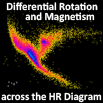Speaker
Timo Reinhold
(Institute for Astrophysics Goettingen)
Description
The Kepler space telescope monitors more than 160.000 stars with an unprecedented
precision providing the opportunity to study stellar variability of thousands of stars.
We present rotation periods for thousands of active stars in the Kepler field. In
most cases a second period close to the rotation period has been detected which is
considered as hint for surface Differential Rotation (DR). We show how the absolute
and relative shear correlate with rotation period and effective temperature.
The fraction of active stars is selected from the whole sample using the range of the
variability amplitude. To detect different periods in the light curves we use the
Lomb-Scargle periodogram in a prewhitening approach to achieve parameters for a
global sine fit. The most dominant periods are associated to different surface
rotation periods.
Since most light curves are dominated by several periods we conclude that DR might be
very common in active stars. Our results match observations and theoretical models
but should be treated with caution. Our method cannot distinguish between the
physical origins of periodicity so there might be some false positives among our periods.
Author
Timo Reinhold
(Institute for Astrophysics Goettingen)
Co-author
Ansgar Reiners
(Institute for Astrophysics Goettingen)

